Just an hour a day makes you (and your writing) more bad a**
Dogs are Smarter Than People/Write Better Now
Note: As always, Shaun is in this podcast, which means there are swear words.
There are a lot of people who advocate spending just an hour a day doing something to become awesome. That hour a day is often learning. You study up about what you want to do, you self learn, you teach yourself to be better by learning all about the thing you’re into.
So, if you’re into writing, you read books about writing and actual books. You study the craft.
So, if you’re into knitting, you study knitting. Entrepeneurship? Same thing, but first you probably have to learn how to spell it. My bad there.
There’s a cool graph here that talks about how if you read a certain number of books, how you compare to other American adults. It’s also a bit depressing because it basically says most Americans read two books a year.
Hallel K has a post on Medium about how you can use the 1-hour rule to catapult yourself into the 1% and I think that’s a great post, but it’s a little hyperbolizing. We like hyperbole though, right? It makes things easy.
Hallel uses a quote by Earl Nightingale.
“One hour per day of study in your chosen field is all it takes. One hour per day of study will put you at the top of your field within three years. Within five years you’ll be a national authority. In seven years, you can be one of the best people in the world at what you do — Earl Nightingale”
This might make you think, “Yes! Right. So true. Epiphany moment.”
Or it might make you think, “Who the hell is Earl Nightingale?”
Well, he has a Wikipedia page? But basically he was a motivational speaker and a radio show host that died in 1989. He wrote Strangest Secret. And to him it’s all about risk taking and he also said that the problem with people’s lives and lack of success isn’t cowardice, but conformity.
According to his definition, a success is when you go after a goal and achieve it. Deliberately. And only 1 out of 20 do that, he said.
The key, he said, is creating, not conforming, deliberate creation. Goals, he said, bring you places. A ship, he says, that has a crew and captain has a destination and it gets out of the harbor and ends up to its destination. But a ship without a destination? Without a captain and crew? If you just turn on the boat’s engines, it might not even make it out of the harbor.
Deliberate learning. Goals. Focus. That’s what matters, he says. Reading, learning? Those are important aspects. Maybe you won’t get in the top 1% of whatever you’re going toward, but you will get smarter, closer, and have deliberate action.
DOG TIP FOR LIFE
Pogie claims to be in the top 1% of Begging. She’s an International subject expert in Food begging. Study in the morning and at night. This, however, is a photo of her apprentice, Mr. Murphy.
COOL EXERCISE
This is from MasterClass and it’s all about goals.
“Create Realistic Goals
“If your goals are unrealistic, they’ll be unachievable and overwhelming. Don’t let your passion for finishing your novel cause you to push yourself too hard and set goals that simply aren’t possible. For example, it might not be reasonable to set a goal that you will write your novel in one month. Neither should you set a word-count goal to write 10,000 words a day—especially if you also have a full-time job. Setting reasonable goals in the first place will make it much easier for you down the road.
“Consider setting writing goals that you can accomplish step-by-step, one day at a time. The best thing you can do is create daily habits that will help you reach your goals—rather than burn yourself out early with ambitious expectations for yourself. Here are some goals that many writers will set for themselves:
Write 1,500 words every day
Write for three hours every day at a scheduled time
Finish one chapter each week
PLACE TO SUBMIT
River Styx Castro Prize 2025 (Deadline September 30)
The Castro Prize, named for our founding editor, Michael Castro, is a new prize awarded annually to exemplary works of poetry and fiction. River Styx editors carefully read and discuss contest entries and ultimately submit the strongest ten entries to the judges. For our 2024 contest, Christopher Castellani will judge fiction and Dg Okpik will judge poetry. We will award one winner for fiction and one for poetry, with one runner-up in each genre. The first-place prizes are $1000 each, plus publication in print and online.
River Styx remains dedicated to publishing the works of writers and artists we believe represent current and future movements in society and culture at local, national, and global levels, whether that work is embedded in historical, contemporary, future, abstract, or impossible contexts. In other words, we seek out work which protests, proclaims, fumes, experiments, innovates, elevates, ruminates, and rushes ahead. And the form that work takes is often surprising, occasionally challenging to our sensibilities and ossified narratives, and always feels urgent and alive in some way.
RANDOM THOUGHT LINK
SHOUT OUT!
The music we’ve clipped and shortened in this podcast is awesome and is made available through the Creative Commons License.
Here’s a link to that and the artist’s website. Who is this artist and what is this song? It’s “Summer Spliff” by Broke For Free.






